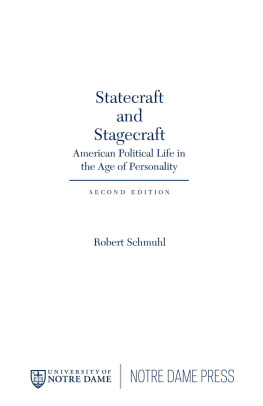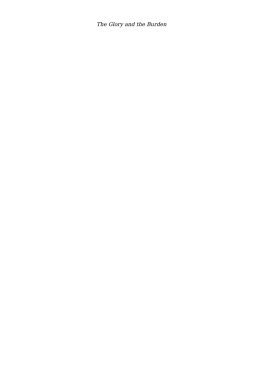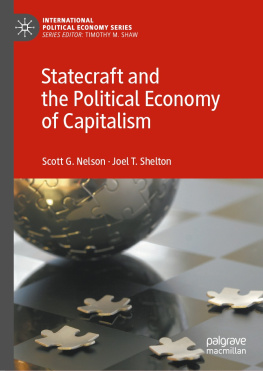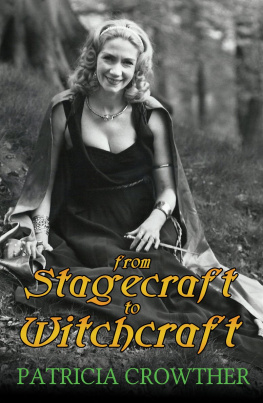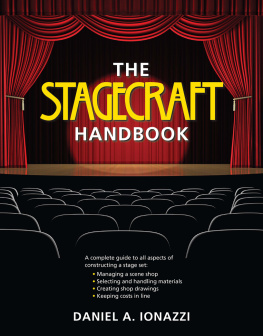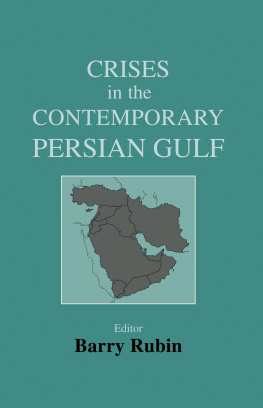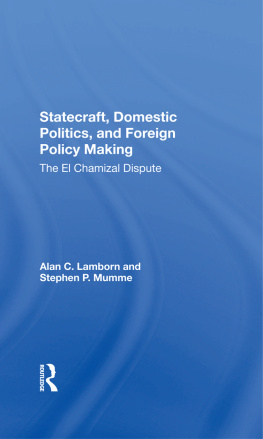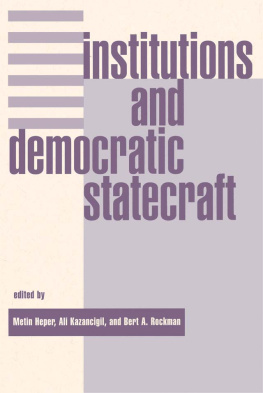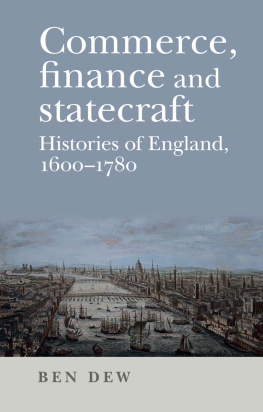University of Notre Dame Press
Notre Dame, Indiana 46556
www.undpress.nd.edu
Copyright 1992 by the University of Notre Dame
All Rights Reserved
Published in the United States of America
Library of Congress Cataloging-in-Publication Data
Schmuhl, Robert.
Statecraft and Stagecraft: American political life in the age of personality / Robert Schmuhl. 2nd ed.
p. cm.
Includes bibliographical references.
ISBN 0-268-01744-1 (pbk.)
1. Mass mediaPolitical aspectsUnited States. 2. United StatesPolitics and government19811989. 3. United StatesPolitics and government1989 . I. Title
P95.82.U6S35 1992
302.23'0973dc20
91-44655
CIP
ISBN 9780268160692
This e-Book was converted from the original source file by a third-party vendor. Readers who notice any formatting, textual, or readability issues are encouraged to contact the publisher at .
A quarter century ago, the Age of Personalitya phrase in this books subtitlewas the relatively youthful progeny of the marriage between that times statecraft and stagecraft. In 2016, Donald J. Trump discombobulated the Republican Party and American politics by epitomizing the dominance of the personality as presented and projected by the media. His celebrity and charismaas well as his ability to command television airwaves and different forms of social mediacarried much greater weight than multipoint policy proposals, long-term party allegiance, or a definite political ideology, as he competed for the presidency. His appeal proved to be primarily visceral and emotional rather than intellectual.
Just as Trumps emergence symbolized the rise of forcespopulist anger, nationalistic fervor, anti-establishment or anti-elite bias, and all the restthat he came to embody, so, too, Trump was an exemplar of a public figure who could take advantage of the various instruments of stagecraft to become a political player with considerable clout. A prior career as a star on a reality television show, coupled with his own business success in real estate, had made him a household name before he announced his candidacyto nearly universal derisionon June 16, 2015.
As his campaign gained more of a following, some commentators and political experts suggested comparisons between Trump and Ronald Reagan, who receives considerable attention in the pages that follow. Superficial parallels between the two do exist. As both embarked on careers in politics, they understood how important the media had become in American civic life. Reagan, however, had spent several decades in Hollywood, working from scripts for movies and television programs, before he decided to run for governor of California in 1966 and again in 1970. What he said to the public was largely prepared in advance (scripted, if you will), and he often wrote his own statements before delivering them.
Trump, by contrast, is a product of reality television, with its emphasis on the vivid personality of the main character and on dialogue that is overwhelmingly improvisational. Its situational, extemporaneous communication that matters rather than deliberately planned, even crafted, expressions such as those Reagan delivered. Moreover, eight years as governor of a large, diverse state provide experiences for the daily hurly-burly a president mightand doesconfront. To paraphrase a former vice-presidential candidate, Donald Trump is no Ronald Reagan.
The magnification of the personality has increased in power and consequence since Statecraft and Stagecraft first appeared. Moreover, the proliferation of media platformsor ways of acquiring political informationhas radically changed the relationship between a citizen and American civic life. Millennials and many Baby Boomers now take for granted an endless array of messages, abbreviated or extended, on their laptops, tablets, or smartphones as well as more traditional means of communication, like television, radio, or print. From the 1990s to today, the media landscape has gone from a field with a sturdy stand of several, deeply-rooted treesthree major commercial television networks, a few key newspapers and magazines, and suchto a dense forest, as far as the eye can see, of arboreal specimens that vary in type, scope, audience, presentation, and viewpoint in the delivery of political content.
A short timeline helps show how the media landscape has developed over the past twenty-five years, altering substantially the ways in which Americans receive information about politics and government:
1996 | Fox News Channel and MSNBC take to the airwaves |
1997 | The Drudge Report website begins, with a conservative slant |
1998 | Google is founded |
2004 | Facebook starts (and grows to 156.5 million users in the U.S. by 2015) |
2005 | The Huffington Post launches, with a liberal slant (and in 2011 AOL bought this website for $315 million) |
2005 | YouTube is created |
2006 | Twitter goes online |
2010 | Instagram joins other social media platforms |
2011 | Snapchat enters the multi-media messaging world |
2015 | Periscope permits live-streaming video with smartphones |
Each of these technological inventions or innovations expanded the possibility for the presentation of political communication. Many more sources, though, challenged traditional outlets for audience and attention. Its important to remember: A person has a finite amount of time to spend with the media on any given day. If new forms of media and their messages appeal to someone, sources that came into existence earlier will lose some of their followers. For example, in 1980, the year CNN began its all-news format, 52 million people (out of nearly 227 million Americans) watched the evening newscasts on ABC, CBS, and NBC. That meant 75 percent of television sets were turned to network news each night. By contrast, Pew Research Centers State of the News Media 2015 reported that total viewership for ABC, CBS, and NBC has now dropped to about 24 millionless than half the earlier audienceat a time when the population exceeds 320 million people.
A useful way to view the contemporary communications galaxy is the metaphorical description formulated by Tom Brokaw, the long-time anchor and correspondent for NBC News. In the book No Time to Think: The Menace of Media Speed and the 24-hour News Cycle (2008) by Howard Rosenberg and Charles S. Feldman, Brokaw explains: I think we are in the middle of another Big Bang. Weve created this universe in which all these planets are suddenly out there colliding with each other. We are trying to determine which ones will support life, which ones will drift too close to the sun and burn up, which ones will meld with another. And the effect of it all is bewildering, both to those of us in this end of the spectrum and those who are on the receiving end. Its a big dilemma and we havent given enough thought to the consequences.

